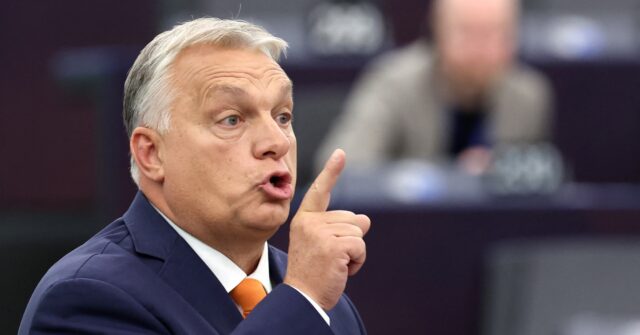Hungarian Prime Minister Viktor Orbán’s recent address to the European Parliament has ignited intense backlash from leftist and globalist factions, particularly surrounding his strong stance on immigration control. As Hungary takes on the rotating Presidency of the Council of the European Union, Orbán articulated critical priorities, echoing former President Donald Trump’s “Make Europe Great Again” slogan. He emphasized that the current EU asylum system is ineffective and criticized the open borders policy that he claims has led to an increase in antisemitism, homophobia, and violence against women in Europe. Orbán proposed a shift towards allowing only pre-approved asylum seekers to enter the EU and suggested the establishment of migrant “hotspots” in third-party countries, resembling the Trump-era “Remain in Mexico” policy, to process asylum claims offshore.
Orbán’s proposals were met with fervent opposition from various MEPs, who expressed their disdain during his speech. Members of the Social Democratic party displayed signs reading “Democrats, not autocrats,” while leftists sang the anti-fascist anthem “Bella Ciao” following his remarks. Criticism escalated with German Green Party member Daniel Freund labeling Orbán a “dictator” and a corrupt leader, and Bulgarian MEP Klára Dobrev directly challenged him regarding alleged Russian influence over his government. Critiques intensified when European Commission President Ursula von der Leyen condemned Orbán’s advocacy for peace talks between Russia and Ukraine, warning against blaming the invaded for the aggressor’s actions. Her comments characterized Hungary as shirking responsibility for illegal immigration and underscored the need for greater EU cooperation in addressing the migration crisis.
The uproar from the leftists culminated in a disruption during Orbán’s address, with a young activist attempting to shout him down in parliament, declaring his aim to overthrow Orbán’s regime. This incident is part of a broader pattern of criticism aimed at Orbán, leading him to assert that the European Commission has morphed from a neutral institution into a politically charged body. He sarcastically pointed out the irony of being lectured on rule of law by politicians associated with extreme behavior while mocking their claims of authoritarianism regarding his government.
Mr. Orbán further defended his position against allegations of authoritarian tendencies, pointing to instances where opposing political views have faced suppression within EU territory, such as the police shutting down a political conference he attended in Brussels. His supporters, including Polish MEP Tomasz Buczek, rallied around him, criticizing the left for only accepting democratic principles when they align with their choices, while Czech MEP Klara Dostalova voiced agreement with Orbán’s motto of making Europe great again.
Orbán’s focus on immigration control not only highlights his administration’s priorities but also reflects a significant divergence in perspectives within the EU. The Hungarian Prime Minister’s proposals challenge the prevailing norms set by Brussels and demand re-evaluation of current immigration policies, emphasizing the need for a cohesive approach among member states to tackle emerging issues. The vehement reaction from the left reveals the contentious atmosphere in European politics, particularly relating to national sovereignty and immigration, where a growing number of leaders are advocating for more stringent border controls.
As Hungary navigates its role in the European Union with its presidency, Orbán’s stance on immigration signifies a broader ideological struggle within the bloc. His arguments resonate with conservative factions advocating for national interests and stricter immigration policies, while the backlash reflects the deep-seated divisions over how Europe should respond to migration challenges. The ongoing debates hint at evolving dynamics in European governance and the potential reshaping of alliances within the institution as it grapples with complex socio-political issues.

